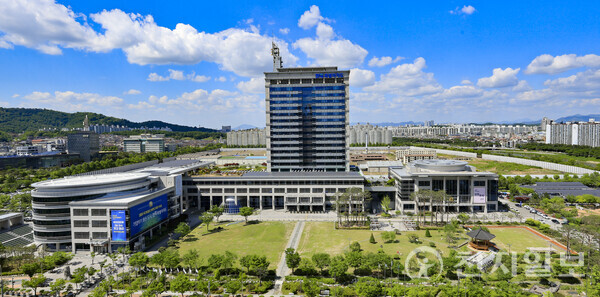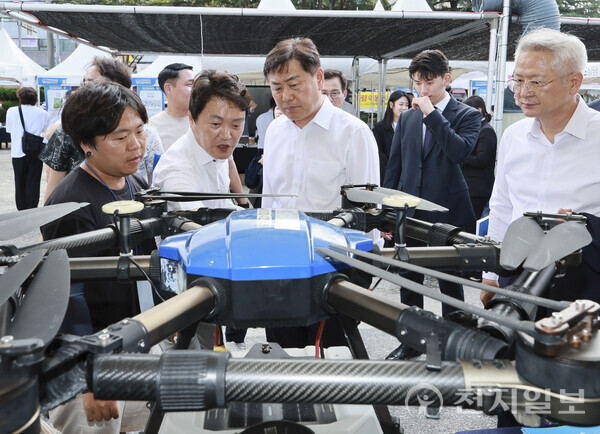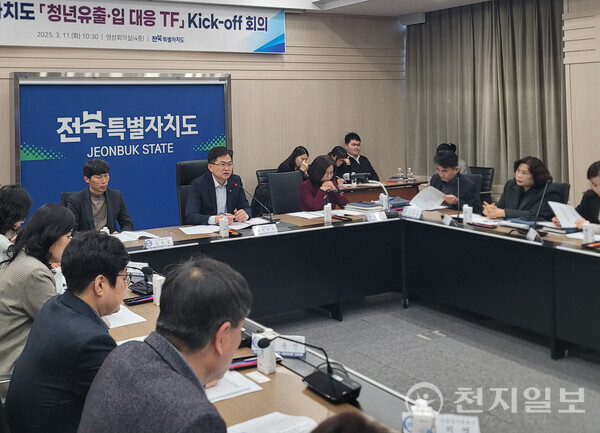It has been about 1 year and 4 months since the launch of the Jeonbuk Special Self-Governing Province. Initially expected to become a turning point for autonomy and balanced regional development, the designation has failed to deliver tangible outcomes, instead fostering skepticism among residents. Alongside the transition, Governor Kim Kwan-young’s 8th administration in Jeonbuk has promoted ₩13 trillion in investment attraction and the bid to host the Summer Olympics, yet key indicators such as economic growth, employment rate, and youth retention have all deteriorated.
Governor Kim’s administration, characterized by ‘performance-oriented’ and ‘event-driven’ policies, is now facing questions about whether it offers practical solutions to fundamentally improve the region. This newspaper takes a comprehensive look at the stagnation of Jeonbuk’s structural economic indicators and the effectiveness of its policies, questioning whether the special self-governing status is a genuine growth driver or a hollow promise.
Series Title
Changes After the Launch of the Special Self-Governing Province (1)
Saemangeum Field Report | 34 Years of Development, Reality Check (2)
Jamboree Field Report | Summer Olympics Bid, Light and Shadows (3)
Tasks for Cultivating ‘Jeonbuk-Style Hallyu’ (4)
‘Special’ in Name Only, with No Tangible Benefit for Residents
Negative Growth Despite ₩13 Trillion Investment
Lack of Policy Sharing, Raising Assembly Concerns
Housing and Employment Conditions Block Youth Settlement
Performance-Oriented Governance Sparks Debate on Effectiveness
Need to Verify Policy Impact and Enhance Public Engagement

[Cheonji Ilbo Jeonbuk=Reporter Kim Dong-hyun] It has been approximately 1 year and 4 months since the Jeonbuk Special Self-Governing Province officially launched on January 18 last year, with the goals of autonomy and balanced development. However, changes felt on the ground fall short of expectations. The 8th popularly elected administration under Governor Kim Kwan-young has pursued large-scale investment attraction, youth policies, and international event hosting, but key metrics—regional gross domestic product (GRDP), employment rate, and youth retention—have worsened.
◆Economic Indicators Fall Short of Expectations
According to Statistics Korea’s ‘2023 Regional Income (Preliminary)’ data released in December 2024, Jeonbuk's real GRDP growth rate was -0.2%, far below the national average of 1.4%. Jeonbuk, along with North Chungcheong (-0.4%), recorded negative growth.
In addition, according to Jeonbuk’s employment trends in March 2025, the number of employed people stood at 971,000, down 21,000 from the same month the previous year. The employment rate fell by 1.3 percentage points to 62.7%. The number of unemployed increased by 8,000 to 27,000, and the unemployment rate rose by 0.8 percentage points to 2.7%.
Youth outflow is continuing. Statistics Korea’s ‘Domestic Migration Statistics’ showed that in 2024, Jeonbuk saw 44,456 in-migrants and 46,263 out-migrants, resulting in a net outflow of 1,807 people.
According to a 2024 report titled ‘Youth Mobility and Regional Population Outflow’ by the Korea Employment Information Service, between 2014 and 2023, approximately 85,826 young people aged 20–39, accounting for 18.8% of Jeonbuk’s youth population, moved away—marking the highest rate in the country. This trend has not seen meaningful improvement even after the special self-governing status was implemented.
At his 2024 New Year’s press conference, Governor Kim declared that revitalizing Jeonbuk’s economy was the administration’s top goal and pledged preparations that residents could tangibly experience. He also stated, “The full revision and implementation of the Jeonbuk Special Law is a signal flare for achieving true local autonomy,” and added, “We will continue to move forward tirelessly for the achievement and happiness of our residents, just as we initially pledged to revive Jeonbuk’s economy.”

◆Assembly’s View: ‘No Visible Change’
The Jeonbuk Provincial Council has pointed out the need for practical cooperation and early consensus-building, emphasizing that the administration must work harder to improve public engagement.
Councilor Lee Myung-yeon told this newspaper, “The administration has often handled major policies by requesting approval after decisions are made, rather than sharing them in advance,” adding, “Real cooperation means forming consensus with the Assembly and sharing responsibility for significant issues.”
He explained, “Special self-governing status means that the province can discover and gain approval for projects that it can implement on its own, exercising autonomy in their operation. The Assembly evaluates how well the province identifies such projects and incorporates them into the Special Law.”
He emphasized, “The province must discover and include legislation it can enact independently into the Special Law, creating Jeonbuk’s own special administration that is practical and beneficial.”
Regarding Governor Kim’s performance, Lee offered a positive assessment. “Unlike other governors, Kim personally visits central ministries to explain projects and appoints aides across party lines, which are new initiatives,” he said. “I see the current phase as one where the foundations for Jeonbuk are being built. If the situation remains the same after another two to three years, it will be problematic, but for now, he’s doing more than past governors.”

◆Youth Perspective: Increasingly Critical
With youth outmigration continuing, fostering youth settlement and attraction has become a key issue, yet young people on the ground acutely feel the gap between institutional policies and real-life conditions.
Seo Seon-a, CEO of youth startup Farmers F&B, said, “Projects like building youth villages and supporting fresh ideas were linked step-by-step and helped maintain relational populations. They also led to central government funding, which I view positively.”
She added, “Initially, I faced capital constraints, so I relied heavily on provincial support programs. Having connected policies allowed young people to continue exploring how to settle in the region.”
However, she pointed out significant practical limitations in rural areas, such as housing, transportation, and infrastructure. “Even though it’s the countryside, housing is expensive and scarce. Most vacant homes are occupied by foreign workers, so housing becomes the first obstacle for young newcomers,” she said. “Without resolving the housing issue, concerns about employment don't even arise in most cases.”
Seo suggested that effective mechanisms such as open-industry entrepreneurship programs are needed. “Support for youth startups is also limited by region and industry, creating barriers for capital-area youth who want to settle here,” she noted.
She continued, “Most education in the region is focused on agriculture, food, and experiential learning. But there’s no education on how to connect these resources to external markets, so the only jobs left are the ones youth don’t want, and the jobs they do want simply don’t exist here.”
The reasons for youth outflow, she said, are “a lack of spaces to share culture or hobbies, limited peer interaction, low wages, and poor conditions for raising children.”
She also stressed the need for regular governance involving private youth teams instead of formal youth councils. “Local governments try to solve regional issues through roundtable discussions, but platforms that actually listen to youth concerns are rare,” she said. “If they are truly concerned about youth outflow and population decline, there must be administrative bodies dedicated to supporting young people.”

◆Institutional Impact Needs Verification Amid Structural Constraints
For Jeonbuk’s special self-governing status to become a true driver of regional growth, it must go beyond improving statistical indicators or hosting large-scale events. While some institutional foundations—such as expanding legislative authority and reorganizing administrative structures—have been established, residents still report low engagement, and doubts about the system’s efficacy persist.
The provincial council does not view the current issues as a matter of short-term underperformance but sees the ability to identify and institutionalize Jeonbuk-specific authorities and autonomous tasks as critical.
Meanwhile, young people are hopeful about initiatives such as the World Korean Business Convention and the Olympic bid, but they warn that without improvements in youth settlement conditions, employment structures, and infrastructure, performance-oriented and one-time projects may instead conceal structural limitations.
The Jeonbuk government is currently pursuing follow-up tasks in line with the implementation of the revised Special Law, including legislative expansions, public institution restructuring, and efforts to strengthen youth and new industry bases. Whether Governor Kim’s emphasis on “speedy execution” can enhance local engagement and deliver tangible results within his term remains to be seen.
- [전국인사이드|전북(1)] ‘특별자치’ 이름에 가려진 전북 현실… 청년은 빠지고 성장은 멈췄다
- [1-Minute cut] [National Inside|Jeonbuk(1)] The Reality Behind the ‘Special Autonomy’ Title… Youth Are Leaving, and Growth Has Stalled
- [1분컷] [전국인사이드|전북(1)] ‘특별자치’ 이름에 가려진 전북 현실… 청년은 빠지고 성장은 멈췄다
- [전국인사이드┃전북(2)] [르포] “새만금 개발은 정치인 실적용… 개발 34년, 투자 체감도는 제로”
- [Nationwide Inside┃Jeonbuk(2)] [Field Report] “Saemangeum development is a political performance… 34 years in, locals feel no benefit”
- [1분컷] [전국인사이드|전북(2)] [르포] “새만금 개발은 정치인 실적용… 개발 34년, 투자 체감도는 제로”
- [1-Minute cut] [Nationwide Inside|Jeonbuk(2)] [Field Report] “Saemangeum development serves politicians… 34 years in, residents feel no change”
- [Nationwide Inside–Chungbuk] A City Without a Reason to Stay Has No Youth: Revisiting Chungbuk's Population Policy
- [Nationwide Inside|Jeonbuk (3)] [Field Report] “We feel sorry for the kids”… Two Years After the Jamboree Disaster, Has Jeonbuk Changed?
- [1분컷] [전국인사이드|전북(3)] [르포] “고생한 아이들에 미안”… 잼버리 참사 2년, 전북은 달라졌나?
- [1-Minute cut] [Nationwide Inside|Jeonbuk (3)] [Field Report] “We feel sorry for the kids”… Two Years After the Jamboree Disaster, Has Jeonbuk Changed?
- [전국인사이드|전북(3)] [르포] “고생한 아이들에 미안”… 잼버리 참사 2년, 전북은 달라졌나?
- [전국인사이드|전북(4)] [르포] “전주한옥마을서 할 게 없다”… ‘맛·멋’ 놓친 전북 관광정책 현주소
- [Nationwide Inside|Jeonbuk(4)] [Field Report] “Nothing to Do in Jeonju Hanok Village”… The Current State of Jeonbuk’s Tourism Policy Missing ‘Taste and Style’
- [1분컷] “전주한옥마을서 할 게 없다”… ‘맛·멋’ 놓친 전북 관광정책 현주소
- [1-Minute cut] “There’s nothing to do in Jeonju Hanok Village”… The current state of Jeonbuk’s tourism policy missing both ‘taste’ and ‘style’
- [전국인사이드┃전북] “성과는 말뿐”… 김관영호, 공약과 정책 모두 흔들린 3년
- [Nationwide Inside┃Jeonbuk] “Achievements in Words Only”… Three Years of Kim Kwan-young’s Administration Marred by Faltering Promises and Policies
- [1분컷] “성과는 말뿐”… 김관영호, 공약과 정책 모두 흔들린 3년
- [1-Minute Cut] “Achievements in Words Only”… Three Years of Kim Kwan-young’s Administration Marred by Faltering Promises and Policies
- [전국인사이드ㅣ전북] “함께 성장” vs “정치 야욕”… 전주·완주 통합 갈등
- [Nationwide InsideㅣJeonbuk] “Co-growth” vs “Political Ambition”… Jeonju-Wanju Merger Conflict
- [1분컷] “함께 성장” vs “정치 야욕”… 전주·완주 통합 갈등
- [1-Minute Cut] “Co-Growth” vs “Political Ambition”… Jeonju-Wanju Merger Conflict

